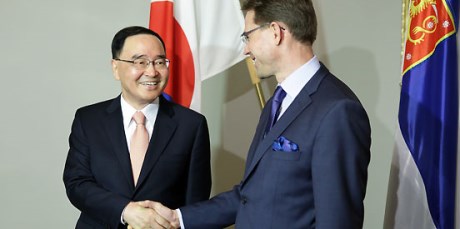South Korea has signed separate bilateral nuclear cooperation agreements with Finland and Hungary.
 |
| Prime Minister Chung Hong-won greets Prime Minister Jyrki Katainen (Image: Finnish Government) |
The agreement between Korea and Hungary was signed on 18 October in Seoul by the two countries' foreign ministers, Yun Byung-Se and Janós Martonyi. According to Korea's Ministry of Foreign Affairs and Trade, the agreement will establish legal and institutional foundations for South Korea to enter Hungary's nuclear power market as well as facilitating cooperation in nuclear-related areas.
Five days later, South Korean prime minister Chung Hong-won and Finnish prime minister Jyrki Katainen witnessed the signing of a bilateral agreement on cooperation in nuclear energy in Helsinki. In a press conference immediately after the signing ceremony, Katainen highlighted "nuclear safety, nuclear waste treatment and nuclear know-how" as areas where the two countries could work together more in future.
South Korea has long set its sights on becoming a major exporter of nuclear reactors. Earlier this year it submitted its APR-1400 pressurised water reactor design for regulatory approval in the USA. Two APR-1400 units are under construction in the United Arab Emirates and four are being built in Korea. The APR-1400 is one of five designs under consideration for a possible fourth unit Finnish utility TVO is considering building at its Olkiluoto site.
Hungary's Paks nuclear power plant supplies some 40% of the country's electricity from its four Russian-designed VVER reactors. Earlier this year, Hungarian regulators gave Paks's oldest unit, which started up in 1982, the go-ahead to operate until 2032. The country's government has also expressed interest in building two new units at the site.
Researched and written
by World Nuclear News






_15863.jpg)







